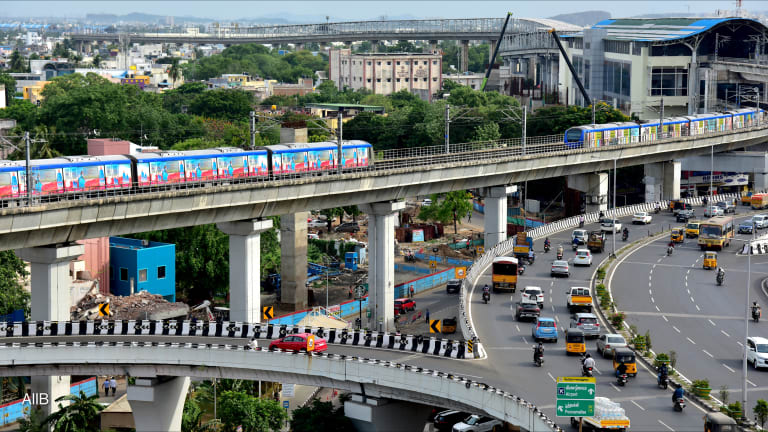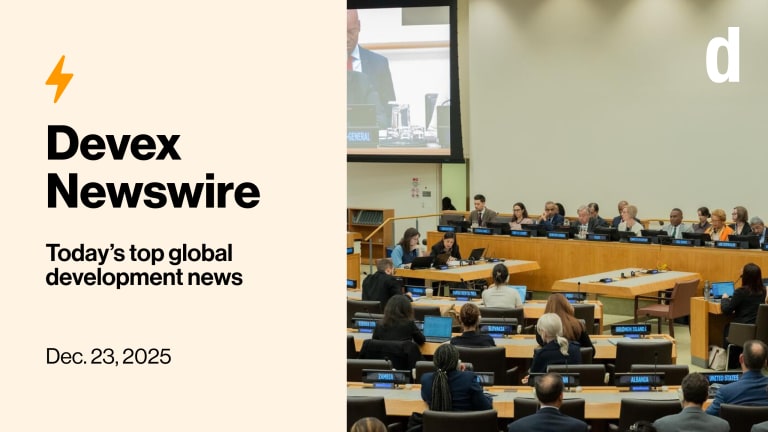AIIB extends deadline, but will more countries sign up?
AIIB has been holding dialogues to address the concerns most holdouts to the China-led bank have, and extended the deadline to give them more time to sign up with founding member privileges, Devex has learned.
Donor countries still on the fence about joining the China-led Asian Infrastructure Investment Bank have until the end of this month to sign on with founding member privileges. Australia, Japan, South Korea and the United States sat on the sidelines when AIIB was launched with 21 founding members and a $50 billion startup capital in October in Beijing. But Prime Minister Tony Abbott has said that Canberra would be “happy” to come on board if AIIB will have governance arrangements like the World Bank. AIIB is slated to start operating at the end of the year, focusing on infrastructure projects like roads, dams and railways in Asia. Shareholdings will be divided according to gross domestic product and there are fears a China-dominated bank would fail to meet global environmental, social and governance standards — fears that AIIB and the Chinese government have been trying to quell. Zhou Qiangwu, a senior adviser to the Chinese government on the AIIB, addressed these concerns last month at the Australasian Aid Conference in Canberra. “In general, AIIB would follow the international practice on policy design and give highest attention to environmental impact [and] resettlement,” he said at the conference, adding that safeguards tackling corruption were a “key” concern. At the same time, he noted that there was “no such thing as best practice for all” and the final policy would be designed to “best suit Asian needs and experience.” Speaking to Devex afterward, Zhou said he expected the internal procedures and approvals needed to set up the bank would be finished by the end of the year. “If that is the case the bank will go into operation by the end of this year or early next year,” he confirmed to Devex. ‘Right time for Australia to join’ The key milestone to watch for is in June, when member countries are expected to have finished negotiations on the Draft Article of Agreement. In the meantime, China would be engaging in more dialogues “to introduce more details about the progress about the policy,” Zhou said. Countries that join before the new March 31 deadline, however, will get special voting rights. “That is the right time for Australia to join … because they will have a lot more privileges and they have more chances to engage with us,” Zhou stressed. Stephen Howes — director of Australian National University’s Development Policy Centre, which hosted the conference — also urged Canberra to sign up to the bank. “The AIIB will certainly have influence on the development agenda but it’s also quite possible I think the AIIB will have some influence on China,” the former World Bank economist told Devex. Further, once AIIB sets social and environmental standards, he noted, the bank could potentially influence Chinese aid. “Perhaps Chinese aid will start to impose conditions, or at least become a little bit more selective and start to worry more about sustainability,” Howes said. “I think we, the Australian government, [nongovernmental organizations] and academics, should be aiming to influence the AIIB not only because of its direct impact through its projects, but because of the broader influence it might exert.” Still divided AIIB’s Multilateral Interim Secretariat is “actively consulting” countries in the region to attract new members. Secretary-general Jin Liqun, the head planner, is understood to have invited Australia to a workshop this month in Beijing, which Australia is considering attending. A number of countries have come on board since the founding ceremony, including Indonesia, Myanmar, Maldives, New Zealand, Saudi Arabia, Tajikistan and Jordan, bringing the total membership to 27, Zhou said. Canberra has yet to make a decision on the bank, however, and has continued to engage in constructive dialogue not just with China but also its other regional development partners. Australia’s senior ministers were divided over joining last year, with Foreign Minister Julie Bishop against the move for geopolitical reasons. Economic ministers were said to have been in favor, including Trade Minister Andrew Robb, who was quoted by the Australian newspaper in December saying that if governance standards were met, “we will be in, enthusiastically, and we shall also be encouraging the USA and Japan to come on board.” The U.S. had reportedly lobbied Australia heavily not to sign up last year, and Zhou believes it was “part of the reason” it didn’t come on board. “We have been consulting with the government of the United States to let them again review their position,” he said. More high-level talks are planned with the United States in coming months. The Chinese official also sought to quash concerns that AIIB will be competing directly with the World Bank and Asian Development Bank — they focus on poverty reduction, he said, while AIIB would “only focus on infrastructure and connectivity in Asia.” But China has also said that it wants to recruit talent from other multilateral banks, including ADB and the World Bank, which is a concern for these financial institutions. Whether it is able to poach talent from other multilateral development banks or not, AIIB is not likely to be fully staffed when it is expected to begin full operations at the end of the year. “If everything is going all smooth in the next two or three years more staff will be coming in,” Zhou said. What would it take to convince holdouts like Australia, South Korea, Japan and the United States that the AIIB would have “acceptable” environmental, accountability and governance standards? Let us know by leaving a comment below. Check out more insights and analysis for global development leaders like you, and sign up as an Executive Member to receive the information you need for your organization to thrive.
Donor countries still on the fence about joining the China-led Asian Infrastructure Investment Bank have until the end of this month to sign on with founding member privileges.
Australia, Japan, South Korea and the United States sat on the sidelines when AIIB was launched with 21 founding members and a $50 billion startup capital in October in Beijing. But Prime Minister Tony Abbott has said that Canberra would be “happy” to come on board if AIIB will have governance arrangements like the World Bank.
AIIB is slated to start operating at the end of the year, focusing on infrastructure projects like roads, dams and railways in Asia. Shareholdings will be divided according to gross domestic product and there are fears a China-dominated bank would fail to meet global environmental, social and governance standards — fears that AIIB and the Chinese government have been trying to quell.
This story is forDevex Promembers
Unlock this story now with a 15-day free trial of Devex Pro.
With a Devex Pro subscription you'll get access to deeper analysis and exclusive insights from our reporters and analysts.
Start my free trialRequest a group subscription Printing articles to share with others is a breach of our terms and conditions and copyright policy. Please use the sharing options on the left side of the article. Devex Pro members may share up to 10 articles per month using the Pro share tool ( ).
Alys Francis is a freelance journalist covering development and other news in South Asia for international media outlets. Based in India, she travels widely around the region and has covered major events, including national elections in India and Nepal. She is interested in how technology is aiding development and rapidly altering societies.








